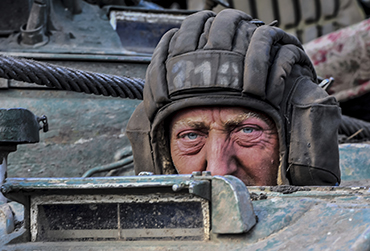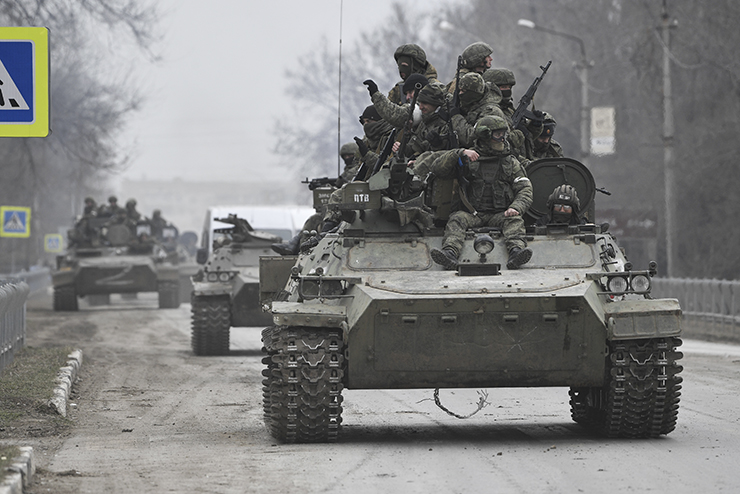Russian President Vladimir Putin’s decision to launch a special military operation in Ukraine was aimed at overthrowing the current authorities in Kiev, blocking NATO expansion eastward, defending the pro-Russian regions of Ukraine, and demilitarizing that country, removing any current or future threats to Russian security in that region. In those terms, the decision for war, as aggressive, ill-advised, and dangerous as it was, is nevertheless readily explicable.
Putin’s fateful decision has not surprisingly prompted a firestorm of anti-Russian propaganda in Western mass media reminiscent of the disinformation campaign to which we were subjected prior to the 2003 Iraq war. The globalist Washington-Brussels-media-corporate nexus (hereafter “the Blob”) has worked itself into a characteristic fit of hysteria, this time trumpeting its claims repeatedly that Putin is yet another reincarnation of Hitler, a deranged tyrant who is an existential threat to democracy.
The Blob does, in fact, viscerally hate Putin and Russia as intolerable impediments to the global expansion of what it calls democracy (that is, woke anarcho-tyranny), and that hostility is an extension of their hatred for Middle America. At the same time, many of our countrymen on the right (mainly Trump supporters) have tended to view Putin as the kind of decisive leader for which they have long waited, and they have thus taken a pro-Russian position.
It’s now clear that in the collective hive mind of the woke, as well as in the popular imagination of the deplorables, Ukraine has become a battle ground for a proxy war. Each side has chosen its good guy champion and its bad guy nemesis. Dear readers, we should not put our trust in princes, especially foreign surrogates. Putin is not a latter-day Prince Vladimir the Great, and Volodymyr Zelensky is not Edvard Beneš. It is neither 1939 nor 1962. Some Americans apparently view the tragic war in Ukraine as an opportunity to indulge in Spanish Civil War or Rambo fantasies, and that’s dangerous for us all.
The battle lines are not always clearly drawn. A significant portion of my Middle American friends and neighbors, for example, still react on cue to knee-jerk anti-Russian propaganda if it is wrapped in an American flag and sold by Fox News. It’s understandable that some Americans, who themselves feel besieged at home, lend their sympathy to the underdog Ukrainians, patriots fighting to defend their native soil. And it’s just as understandable that other Americans recognize in Moscow a formidable opponent of the Blob and therefore lend their support to Russia. I would caution my fellow deplorables on either side of this conflict, however, against emotionally investing so much in a fight that is not our own. We’ll need that energy for our own battles.
In my view, Ukraine’s best chance for freedom and stability would be as a neutral state. Russian security concerns must be taken seriously. The anti-national, ideologically driven Blob, however, cannot even imagine the concept of national interests, and cannot, therefore, think in terms of a traditional balance of power. But it’s important for us to understand how this all came about.
The fall of the Berlin Wall in 1989 was a signal moment in modern history. To all intents and purposes, the Cold War with the Soviets was over. We would hear talk of a post-Cold War peace dividend, a decrease in the vast array of American military commitments. We had borne the burden of doing battle for the free world, and it appeared that there was a chance America would come home.
It was not to be. The Soviet Union remained standing but was fragile, reeling from Soviet reformer Mikhail Gorbachev’s policies of glasnost (“openness”) and perestroika (“restructuring”), which had unleashed a firestorm of previously pent-up popular frustrations concerning the union’s traumatic totalitarian past and the failures of Soviet socialism. The Soviet economy was also in shambles. Moscow was losing its Eastern European satellites, and nationalism was pulling the USSR apart at the seams. The failed 1991 anti-Gorbachev coup was the last gasp of a moribund Soviet nomenklatura. The Soviet Union collapsed in December of that fateful year.
The Soviet economy imploded. The ruble became worthless; jobs evaporated; and crime, disorder, and corruption were rampant. Life expectancy plummeted in post-Soviet Russia. The long-standing Russian curse, alcoholism, became endemic in Russian life. Abortions substantially exceeded births, suicides soared, and law enforcement collapsed along with the unkept utopian promises of a failed system.
Nearly one year after the great collapse, your faithful observer was in Vladivostok, in Russia’s Far East, on the Sea of Japan’s Bay of the Golden Horn. Vladivostok was formerly the home of the Soviet Pacific Fleet. At the time I was there, the rusting hulks of the newly formed Russian Navy were abandoned in their docks, listing and lifeless. I walked past them on a cold day in November, and they looked like bizarre modern sculptures, unguarded, unwanted, a gallery with an audience of one.
At the naval base on nearby Russky Island, Russian sailors had gone unfed, as their officers failed to provide them rations for months. Some of them starved to death.
A winter storm had frozen Vladivostok. The streets were covered with ice and packed snow; the power grid failed, and without heat, the residents of Vladivostok had begun dismantling wooden structures to use as heating fuel. Police were deployed to prevent complete chaos.
A week later I was in Moscow. Beggars were quite common: amputees, destitute pensioners, old war veterans wearing their threadbare uniforms and tarnished medals. Through it all, I noted the good will of many of the Russians I met, people who seemed glad that the Cold War was behind us. They welcomed Americans and hoped for friendship between our countries. That was an opportunity America would miss, and it has damaged both countries.
The emotional warmth I sensed would not survive the shock-therapy economic policies of the Russian government, which, on the recommendation of Western advisors, had gone all in on neoliberal reforms, lifting price controls and beginning the massive sell-off of Soviet-era assets. The wild ’90s traumatized the Russian people in ways Westerners failed to fully understand at the time.
There is also the historic Russian distrust of the West, the flip side of the goodwill I had seen so often in the early stage of Yeltsin-era Russia. By the end of the ’90s, with NATO bombing targets in Serbia, a traditional Russian ally, Boris Yeltsin made his displeasure known to “friend Bill,” as he called President Clinton. His protests were to no avail.
NATO expanded eastward toward the borders of a weakened Russia, though the Russians had been told informally by American officials that would not happen. Relations with the West would continue to go downhill for some time, but a turning point was reached when an ailing Yeltsin resigned on New Year’s Eve, 1999, elevating Prime Minister Vladimir Putin to the presidency.

In 1989, Francis Fukuyama published an essay in The National Interest that would become a widely discussed book in 1992: The End of History and the Last Man, a blueprint of sorts for globalist ideology. What Fukuyama posited wasn’t that all of life’s struggle, strife, and achievement—what most of us think of as history—would end, but that human development had reached an end point. In other words, the apex of the evolution of mankind’s social, economic, and political development had been attained in liberal democracy, a concept that has since morphed into what we recognize today as “woke” politics and corporate globalism.
The post-national elite that had emerged following the Cold War disdained the nation-state, which the global managers envisioned withering away as transnational institutions and a new, global citizenry displaced distinct peoples and national identities. According to the globalist gospel, consumerism would satisfy every human need, and the masses would settle into their role as cogs in a vast economic machine, one unimpeded by traditional boundaries, moral precepts, and oppressive social institutions. So went the theory.
Old-fashioned patriots mocked Fukuyama, partly misunderstanding his thesis but also misunderstanding the nature of the Cold War itself. Traditionalists had viewed the battle as one against godless communism, a fight to protect traditional values and socioeconomic structures; but they had allied themselves with a liberal-left nexus that had tightened its hold on the West with a victory in a different war, the one against Nazism and Fascism.
The victory in that war solidified liberalism’s ideological triumph in the West and further extended its cultural and social reach in popular entertainment, education, and the corporate world. A liberal-left long march through our institutions would marginalize and later practically outlaw anything that even vaguely resembled a genuine right in America. Fascism—a word which the liberal-left would take to mean any manifestations of what it considered dangerous, atavistic impulses like patriotism or religious and social conservatism—had been defeated. Right-wingers were on the wrong side of history. Any doubts about the globalist development vector were suspect in the eyes of post-national elites.
Those who failed to get the globalist memo would become the nucleus of the “deplorable” pushback against the Blob. World leaders who rejected woke politics and globalism, such as Putin and Hungary’s Viktor Orbán, were included with Donald Trump on the Blob’s blacklist of Hitler clones.
But Putin is neither Hitler nor Stalin. The truth is that he isn’t even Brezhnev.
As Patrick Buchanan has reminded us, during the Cold War American administrations did not believe that countering the Soviet invasions of Hungary in 1956 or of Czechoslovakia in 1968 were matters of vital American interest. Then, there was a sense of America’s geopolitical limits. Washington recognized that Hungary and Czechoslovakia had fallen under Moscow’s sphere of influence, and nobody was going to risk World War III to do anything about that.
In fact, four years after the Czech invasion, President Richard Nixon went to Moscow to negotiate arms limitations with the Kremlin. Clearly, easing tensions and controlling nuclear weapons was in the American interest.
Even in the 1990s, venerable wise men like George Kennan and Paul Nitze opposed expanding NATO, strongly favoring a new approach to security policy that would account for Russian interests. Kennan, considered the author of Cold War containment policy, wrote in a Feb. 5, 1997, opinion piece for The New York Times that expanding NATO eastward would be a “fateful error” which would “inflame the nationalistic, anti‐Western and militaristic tendencies in Russian opinion” and “restore the atmosphere of the cold war to East‐West relations.”
Kennan and the other wise men were correct but they were ignored. Without excusing Russia’s invasion of Ukraine, we should acknowledge that we are now seeing the costs of ignoring Kennan’s warning. What’s more, no one in authority seems to recall the destructive results when the Western allies’ humiliated a defeated foe following World War I: It led to World War II and the Cold War. Victory in the Cold War has only precipitated a new conflict. In a sense, WWIII has already begun, with Russia, China, India, and much of the global south aligning against the Washington-Brussels-Davos axis.
Prior to the outbreak of war, Putin’s main demand was a written guarantee that NATO would not expand any farther eastward, and that demand was rejected out of hand. Russia has always feared encirclement, and the globocrats seem determined to make that fear a reality. Anyone who watched Putin’s speeches prior to the invasion of Ukraine has had a glimpse of the anti-Western and militaristic tendencies in Russia that have been inflamed by NATO expansion—not to mention by Washington’s regime-change operations, support for color revolutions in the former Soviet states, Western-backed attempts to undermine Putin domestically, U.S.-financed bio labs experimenting with dangerous pathogens in Ukraine, and even insane calls for Putin’s assassination by Senator Lindsey Graham and others. Why is Russia’s reaction a surprise to anyone?
The scale of the Blob’s hubris, hypocrisy, and arrogance is staggering. The globalists care nothing for Ukraine, which is but a pawn in their dangerous game. They have been using that country as a means of undermining Putin’s regime, placing Ukraine in the Kremlin’s crosshairs. In 2013, for instance, Putin offered Kiev generous economic terms to keep Ukraine out of the Western fold. The overthrow of President Viktor Yanukovych, who had decided to accept Putin’s terms, followed. The street rebellion was egged on by American officials, including Senator John McCain, who were actively subverting a government Washington recognized as legitimate. Of course, it was all supposedly done for the cause of freedom. That’s just one incident among others that set the wheels in motion for the crisis we are seeing today.

As with Georgians in 2008, the Ukrainians were led to believe that NATO was behind them. There has been a lot of talk about Moscow’s reckless miscalculations in Ukraine, and, indeed, they are evident, but what about Washington’s duplicity and Kiev’s willful blindness?
Am I alone in thinking that some globocrats might wish to prolong the war, savoring their nauseating sanctimony, and playing the great game they all love so well?
And what about American gamesmanship, specifically? What can one say about American foreign policy in the aftermath of the Soviet Union’s collapse, except that it is truly foreign to the real interests of Americans? Western elites interpreted the end of the Cold War with the Soviet Union not as an opportunity to return to normal international relations but as a mandate to expand globalization.
It is the Davos Politburo and its Deep State minions who are mounting a fervent ideological crusade, not Russia. But in the narrow, muddled minds of these elites, they view themselves as the good guys, and those who reject globalism as the bad guys. NATO can’t be a threat, as they see it, because it is good and on the right side of history. Anyone who would view NATO expansion as a potential threat, or as against American interests, is evil.
They are true believers in globalization, made evident as well by their relentless war against historical America as a distinct nation. That war, not Russia, is the real threat to us. Globalists do not acknowledge that we, the Middle Americans who have provided much of the cannon fodder for their wars of choice, have any legitimate interests or concerns, just as they deny the same for other countries.
Whatever the outcome to the conflict in Ukraine, we should hope it is not one the Blob can consider a victory, for that would likely mean even more foreign interventions, more support for color revolutions, and more destructive hubris from the usual suspects, creating still more enemies for America. I would add that it would also likely mean an even more intense crackdown on so-called domestic terrorists, meaning people with right-wing views who will be labelled Russian agents. Do ordinary Americans not realize that transnational corporations intent on “cancelling” Russia today could easily cancel them tomorrow, as indeed they have already begun to do with right-wing dissenters?
Post-Communist Russia is not our enemy, but the Blob and the global oligarchs are. It is not Vladimir Putin who is dissolving our borders, rendering American citizenship meaningless, and supporting Antifa and Black Lives Matter radicals. It is not Putin who is seeking to suppress political dissent in the U.S. It is not Putin who is promoting critical race theory in our schools or browbeating us about an invisible and ill-defined structural racism. It is not Putin who is attempting to defame American history, destroy our historic monuments, and promote gender fluidity to our children.
Unlike the destiny of Ukraine, what’s happening at what used to be our southern border is of vital interest to our people and is indeed related to the Blob’s efforts to erase the nation as such, replacing us in the process.
It is disheartening to see how passionately engaged many Americans are over Ukraine, showing a level of anger and intensity I seldom see displayed over the fate of their own country and people. Come home, America. It’s the only one we have.

Leave a Reply